Shattered World - A Worse World War : Part 45
Shattered World - A Worse World War :
Part 45
Fire in the East
June 11th 1948 to July 11th 1948
General Udentinsh sat wearily in his canvas chair and stared once more at the field map spread
out across the tent wall in front of him. Crude hand drawn arrows showed his current thrusts into the German
positions and all of them were shorter and narrower than he would have liked. More
disturbing were the more recent arrows pushing back into his own lines! His
planned offensive towards Kharkov was rapidly becoming more of a defensive
campaign as the Germans bit into his flanks with sharp and nasty counter
attacks. And now intelligence was talking about a sizeable buildup of
German mechanized forces, possibly involving several panzer divisions. His latest
orders from Beria left no doubt what the leader of the Soviet Union wanted. He
must advance, casualties were irrelevant. Irrelevant they may be, but
the losses were mounting and easily matching the worst campaigns of the
Eurasian War.
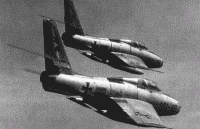 German tactical fighter-bombers |
General Udentinsh was about to begin gathering his
staff when a familiar rumble caught his attention. The scream of jet engines
was very distinctive and had become much too familiar in recent days. Air raid
sirens arrayed around the headquarters complex began to wail even as the scream of
the jet engines grew louder and anti-aircraft weapons of all calibers opened
up. The German jet bombers were fast and maneuverable and could roam
virtually at will over the Soviet countryside. This did not stop his fellow Russian
countrymen from doing everything they could to stop them anyway. There was a
lot of AAA massed around the headquarters and their roar was deafening.
|
Realizing that he wouldn't have
time to reach the bomb shelter Oto Udentinsh, General of the Soviet Union, simply dove for the meager
cover of his iron-framed cot as any common soldier would have done. Flattening
himself as close to the floor of the tent as possible Marshall Udentinsh
waited for the inevitable impact of falling bombs as the hammering of
anti-aircraft guns filled the air and the scream of the approaching jet
aircraft grew louder an then began to recede as what sounded like several jet bombers roared
overhead and on to the east. Holding his breath, General Udentinsh waited for the bombs to impact and prayed to God that none impacted on him.
The impacts came as expected with thunderous
explosions and a shaking of the earth. Dust filled his tent but luckily no shrapnel
pierced his tent or his flesh. General Udentinsh was getting
up and beginning to wipe the dust off his uniform when he noticed something was
wrong. His hands began to tremble and he noticed an odd tightness in his chest.
Screams began to drift into his attention apparently coming from men around his
tent. Pain came then, swift and terrible, and he thought of nothing outside of
his own agony. His vision began to dim and he felt himself begin to drool as he
crouched on the ground wracked by convulsions. Mercifully, coma set in before
the General's central nervous system failed altogether and he died where he lay
along with his staff and most of the soldiers assigned to his head quarters
unit.
June 11th 1948
Germany opens its counter-offensive towards Voronezh with
a massive conventional barrage as well as the large-scale use of nerve gas
against Soviet front line units, head quarters, and rear assembly areas. The nerve
gas proves to be devastatingly effective against a Red Army that is equipped
for the chemical battlefields of World War One. Initial German progress is
startling rapid as panzer divisions leap forward into Soviet rear areas before
Soviet front line units, reeling from the effects of nerve gas and massive
conventional bombardments, can react. The Luftwaffe also launches a surge on
this front using aircraft moved down from Scandinavia and the Baltic theatre to
supplement their squadrons. The result at the end of the day is several gaping
wholes in the Soviets lines and a near collapse in this section of the German
front. By nightfall the German offensive has moved faster than even the High
Command's optimistic first-day projections.
In the Baltic region, Valga has fallen to Soviet
forces and the main Soviet thrust in this region is now smashing its way
southwest through Latvia and has pocketed the north-central Latvian city of Valmierra.
Further north Soviet forces advancing west in Estonia have surrounded Tapa
where Estonian soldiers have chosen to fight to the death. In Scandinavia
Soviet forces have not been able to make much headway against the Aurora
defense line and that theatre is largely mired in a stalemate with both sides
sending many aircraft south to the more critical fronts.
The Soviet offensive towards Minsk has now nearly
succeeded in surrounding that city. German panzergrenadiers have been able to
keep open a corridor to the west preventing, so far, Minsk from being pocketed.
German forces in and around Minsk have fallen back to the innermost ring of
defenses in the outskirts of the city. The Germans are preventing civilians
from fleeing west to prevent them from clogging the lone road to the west that
they still hold - thus civilian casualties are mounting as the Soviets bombard Minsk
with every form of conventional and chemical munition that they possess. The air
war in the skies over Minsk and the surrounding region is as intense as any
ever seen with both sides loosing large numbers of aircraft. Neither side has
the upper hand in the air here although the Soviets are expending far more
aircraft and pilots than the Germans.
On the southern front - Soviet forces have surrounded Rostov
but not before the bulk of German forces fleeing northwest into the Ukraine
successfully make their escape. Soviet forces have turned south and are now
sweeping through the north-central Caucasus with little resistance to stall
them. Further south Soviet forces are probing into the mountains of the central
Caucasus where the third axis line of defense, and its well-entrenched German
divisions, quickly repulses several hasty Soviet attacks. The Soviets have been
forced to halt their advance as they consolidate their hold over the northern Caucuses
and bring forward reserves for what they expect to be an exceptionally bloody
effort to crack the mountain defenses of the Germans and Turks.
Hitler, now seeing Baku located precariously between
Soviet forces to the North and British forces to the south, has ordered
reinforcements sent to the southern Caucasus. The Germans hold the Black Sea so
getting reinforcements there won't be a problem if the High Command can find
the divisions to spare. Beria, for his part, commands his generals to continue
the push forward across the entire front, �let the fascists catch their breath
and they�ll be driving for Moscow before we can blink� he tells the assembled
head quarters staff of the Red Army.
June 12th 1948
Italian forces launch a new offensive across a broad
front into northern Tunisia. A surge of Italian and Luftwaffe aircraft manages
to destroy many Free French aircraft on the ground and the rail line linking Tunis
to Algeria is hit hard in several places. The Free French have been expecting
this attack and are well entrenched in a strong defensive line with several
belts of trenches and fortifications. The Free French have also managed to
assemble an armored division, consisting of American Pershing I's and upgraded
Shermans of various types, and intend to counter-attack once the Italians
become bogged down in the defensive belts. One thing the Free French have a
critical shortage of is reconnaissance aircraft and they have failed to notice
the unusual buildup of armor in the Kasserine pass.
|
Argentina completes the first of 25 planned
submarines. The Argentine submarine design is an upgraded version of a 1930's
German submarine model. Argentina has decided to build submarines rather than
attempting to bulk up their surface fleet because the British South Atlantic
fleet is simply too powerful for them to openly challenge. A submarine fleet
would allow Argentina to engage in commerce raiding in hopes of convincing the
British to come to the peace table. The ongoing British blockade of Argentina
and Uruguay has been devastating to the economies of those nations but it has
also forced them to begin developing their own civilian and military
industries.
|
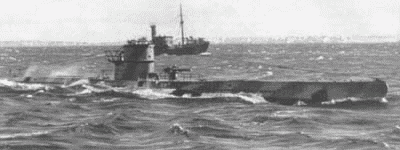 Argentine Submarine "General Belgrano"
|
June 13th 1948
German forces have now captured Belgorod and have
advanced 60 kilometers across a 100 kilometer front in their massive counter
attack towards Voronezh. The Soviet forces which had been slowly inching
towards Kiev have now been forced to begin moving back east to counter the
German thrust. After enjoying two days of almost total air superiority the
Luftwaffe in this region now finds itself again locked in an intense air war
with massive numbers of Soviet aircraft. Despite the situation in the air
improving for the Soviets the situation on the ground remains bleak. German
nerve gas attacks, although now less of a surprise, remain extremely effective
as the Soviets simply have no adequate equipment to wage war in a nerve gas environment.
Their only means of response is to hit back with as much of their own chemical
weapons as possible in an attempt to suppress German artillery.
The Luftwaffe has thrown nearly its entire force of
Ural heavy bombers into a massive bombing campaign around the major hub of Kursk
in an effort to stop or at least slow down the flow of supplies to the huge
Soviet army in the northeast Ukraine. Some 550 Ural bombers, escorted by
German, Ukrainian, and Romanian fighters of all types, hit Kursk's rail yards
in a massive daylight raid that virtually wipes out the rail yards and much of
the city of Kursk in the resulting firestorm. Devastatingly, the attack
includes the use of both nerve and mustard gasses and kills much of the
civilian population in the vicinity of the rail yards - tens of thousands of
them.
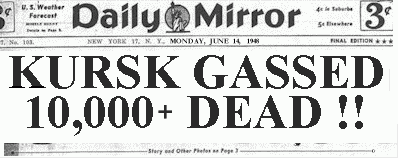 Shocking News! |
On German radio and television Goebbels
excuses the chemical attack against Kursk by pointing out that the Soviets
have been using their own chemical weapons against numerous cities in the
Baltic States and the Ukraine. To which the Soviets respond that they only
used chemical weapons against military targets and that , yes, collateral
damaged did occur - but the German attack represents the first case of
chemical weapons being used in a purely strategic bombardment. It is a
fine distinction that could affect the future of many, many, European
cities. |
June 14th 1948
With the Italians pressuring Free French forces in Tunisia
along the entire front - Rommel's 8th panzer army launches a blitzkrieg attack
from positions in and around the Kasserine pass. Free French forces in this
region are small in number and ill-prepared as the Italian axis of advance has
always been due north towards Tunis rather than west into Algeria. Rommel has
achieved total surprise and by the end of the day his panzers have cut west
some 40 kilometers into Algeria and are already beginning to wheel north
towards Annaba on the Mediterranean coast of northeast Algeria. Rommel's intent
is clear - he intends to drive northwest to the Algerian Mediterranean coast
and cut off the 100,000 Free French soldiers in northern Tunisia. It is a bold
gamble as supplies of fuel and ammunition are barely adequate for offensive
operations.
Soviet bombers hit rail yards in Kiev and Poltava with
a mixture of mustard gas and conventional weapons. The attacks are far smaller
than the German attacks on Kursk, and cost the Red Airforce many downed
bombers, but they were done more for reasons of propaganda and politics than as
any serious effort to break up the German lines of supply through the central Ukraine.
June 15th 1948
The German offensive towards Voronezh continues to make
excellent progress as the city of Staryy Oskol has now been surrounded and is
in the process of being reduced by German artillery and infantry. The main
armored spearheads of the 1st SS Panzer Army are now 50 kilometers southwest of
Voronezh. Rear echelon and reserve Soviet units in the vicinity of Voronezh
are now digging in to make a stand along the line of the river Don.
|
The last Japanese forces in Indo-China
withdraw behind defensive works along the Chinese/Indo-China border. As
U.S. and British forces consolidate their lines of communication in
Indo-China, Ho Chi Minh declares the independent Republic of Vietnam,
requests entry into the Alliance for Democracy, and declares war on Japan.
The Free French immediately oppose the formation of an independent Vietnam
and block Vietnam's entry into the Alliance. |
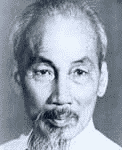 Vietnamese nationalist leader Ho Chi Minh
|
June 16th 1948
|
German forces secure a bridgehead over the river Don
to the south of Voronezh and begin to exploit the crossing immediately. By
the end of the day half an armored division has crossed and the Germans
are well into the process of breaking out across the Don. The Soviets have
little to stop the Germans from taking Voronezh. German bombers are
continuing to pound Soviet transportation hubs in and around Kursk and the
effort is paying off as Red Army Units to the southwest of Kursk are
becoming critically short of fuel and ammunition. |
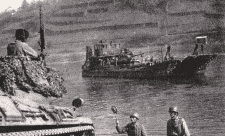 Germans crossing the River Don
|
The German forces in the Orel pocket, meanwhile, continue to hold
despite constant pressure from all sides and near-constant chemical attacks.
Beria and Stavka are beginning to realize the magnitude of the looming disaster
in this sector. With Orel still holding out and German forces approaching Voronezh
the entire million man Soviet army south and west of Kursk will be in danger of
being caught in a massive pocket. Soviet reserves massed around Moscow, 30
fresh divisions in all(including armored divisions), begin to prepare to move
south.
In eastern Algeria Free French holding actions have
mostly failed to delay Rommel's lightning advance. German panzers have already
bypassed the Free French strong point at Tebessa and are now driving head long
for the Mediterranean coast and out-running their fuel supply lines. Free
French forces in northern Tunisia are attempting to disengage from the Italians
in order to turn west and block Rommel's advance but the Italians, desperate to
take Tunisia now that they are getting the German support they have been asking
for, are pushing forward with a new tenacity.
In the western and south-central Ukraine the
seriousness of the virulent new wheat crop blight that emerged the previous
weak is now beginning to draw the attention of officials in Germany. The blight
is spreading rapidly and threatens to put the entire wheat crop of Eastern
Europe in danger if it can not be contained. Suspicious of the timing of the appearance
of the new blight, leading German agricultural experts and military intelligence
officials are being dispatched to the areas where the blight was first
reported. News of the blight is slowly moving up the chain of command in the Ukraine
and in Germany.
June 17th 1948
In the Baltic region Soviet forces continue to advance at
a steady rate despite the growing tenacity of resistance put up by the
desperate soldiers of the Baltic states. They know what they have to look
forward to at the hands of Beria if the Soviets regain control.��
German forces begin evacuating Minsk after Hitler
finally relents and allows the city to be abandoned. However, Soviet forces
continue to hammer the lone corridor out of the city and holding it open will
be a very difficult task with hordes of Red Army tanks approaching from the
north and south.
A major Soviet push towards Grozny is repelled with
heavy losses in the northern foothills of the Caucasus mountains. The Germans
intend to hold the oil fields around Grozny and have been preparing the
defenses in the region for years. Along the coast of the Black Sea Soviet
troops have taken possession of the ports of Novorossik and Tuapse forcing
Germany to rely on the southern port of Batum to ship supplies and
reinforcements to the southern Caucasus - and to ship oil from Baku back to
Germany.
There is a pipeline running from Baku across to Batum
and then freighters transport the oil across the Black Sea to Odessa or Istanbul.
The oil from the Grozny fields used to move by pipeline to Rostov but now that
the Soviets control the northern Caucasus this oil must move via rail and truck
down to Baku and then by pipeline to Batum.
Japanese forces complete their evacuation from coastal
Siberia as the last troop transports disembark with Soviet troops not far
behind. In the final phase of their scorched earth operation the Japanese have thoroughly
destroyed all the significant harbor facilities and contaminated them with
anthrax and bubonic plague as well. In addition to this civilian residential
districts were shelled with chemical weapons in order to clog Soviet medical
logistics in the region. Coastal Siberia has largely been rendered into a
wasteland and some 25% of the region's civilian population will be dead of
starvation and disease(natural and man made), within the next several months. Vladivostok
is the only city in coastal Siberia that the Japanese intend to defend and they
have left a garrison of 10,000 soldiers there to fight to the death.
In Manchuria the Japanese are in full retreat towards Korea
and China as the puppet state of Manchuria falls apart around them. Soviet
forces are already approaching the Manchurian capital of Changchun.
June 18th 1948
Baghdad falls into British hands after the last Iraqi
defenders in the city surrender. British mechanized columns are already racing
north towards Mosul and the northern oil fields as the Iraqi government and
army are now in full collapse.
Rommel's leading panzer spearheads reach the Algerian Mediterranean
coast near Annaba and have only a day's worth of fuel remaining. The Free
French are still holding out at the transportation hub of Souk Ahras and this
is disrupting Rommel's tenuous supply lines.
June 19th 1948
Two German armored pincers link up north of Voronezh
putting that city under siege. Another German pincer is already cutting
northwest towards Orel in hopes of relieving the Orel pocket and trapping
Soviet forces around Kursk. Soviet reserve forces are massing in Tula for a
push south to blunt the German counter-offensive.
German and Italian infantry, with massive air support
now that air superiority has been achieved in the region, capture the Free
French stronghold of Souk Ahras, allowing fuel supplies to flow freely north to
the leading elements of the 8th panzer army at the coast.
The U.S. Navy's powerful 5th fleet, with its taskforce
of 7 Essex class carriers and numerous smaller escort carriers, enters the South
China Sea. The Japanese, seeing this as the best possible chance for a "decisive
naval victory", begin moving their remaining carriers from the central
Pacific and the Home Islands towards the vicinity of Formosa.
The Manchurian capitol of Changchun
and the strategic city of Mukden have both fallen into Soviet hands as
Manchurian forces are now mostly laying down their arms and returning home. The
Japanese are hastily attempting to establish lines of defense along the Yalu in
northern Korea and along the Manchurian-Chinese border.
June 21st 1948
 Cougar I's counter-attacking the Free French |
The Free French attack into Rommel's eastern flank
with all of their available reserves, including the single armored
division they have carefully assembled, in an effort to re-open lines of
supply into Algeria. The Free French attack is a disaster from the
beginning. German and Italian aircraft dominate the skies and hammer Free
French mechanized columns disrupting the timing of the offensive. Rommel's
superior Cougar I's and II's have had two days to rest and take up strong
positions and wherever they come into contact with Free French armor they
tear them to shreds. |
June 22nd 1948
The Soviets capture the Estonian capitol of Tallinn and
are approaching within artillery range of Riga. In Lithuania Vilnius has come
under siege and is coming under massive chemical bombardment to root out the
fanatic German and Lithuanian defenders. German forces are now moving into prepared
defensive positions on the border between East Prussia and Lithuania in a
signal that the German High Command has abandoned the hope of holding the Baltic
States.
The Free French push against Rommel's eastern flank
has come to a ragged, bloody, end as scattered Free French units withdraw back
into the northern Tunisian pocket in chaos. An entire Free French army is now
pocketed in northern Tunisia with little hope of relief.
With British forces within 20km of Mosul the Kurds of
northern Iraq launch an uprising against the remnants of Iraqi authority in the
region. Kurdish militia groups enter Mosul and other cities across northern Iraq.
The Kurds have been planning this uprising for some time and the approach of
British forces has forced them to move up the time table.
The remnants of the Luftwaffe in Iraq have already
evacuated and are now establishing logistics to operate from Turkey.
June 23rd 1948
With Vilnius and Minsk now secured the Red Army intends
to drive southwest towards Brest and the Polish border. The plains of western Belarus
make excellent take country and the Soviets maintain a large numerical
advantage in armor. Taking back the rest of Belarus would complete one of
Beria's main war aims and allow him to focus on blunting the German counter-offensive
to the south.
|
Soviet troops enter Riga where brutal
house-to-house fighting begins. German and Latvian infantry have dug into
the port district of the city and intend to fight for as long as possible
before being evacuated by the Kriegsmarine. Several German cruisers off
the coast of Riga are providing direct- fire support to the garrison in
the city and the Luftwaffe continues to provide some air support from air
bases in East Prussia and northeast Poland. |
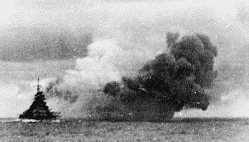
KMS "Tirpitz" supporting the defenders of Riga |
De Gaulle has been forced to mass his remaining forces
in North Africa to defend Algeria. A Free French plan to supply the northern
Tunisian pocket by air is rejected by the British as impractical given Axis air
superiority over Tunisia. Supply by sea is also virtually impossible since the
Axis dominate the central Mediterranean. The Italians, meanwhile, continue to
push slowly north towards Tunis as Free French forces are forced to pull back
and consolidate their positions as supplies of ammunition and fuel dwindle.
June 24th 1948
British forces enter Mosul without a shot being fired as
the Kurdish militia which recently captured the city allows them free entry. In
secret negotiations between the British and several Kurdish factions the
British have agreed to allow Kurdish autonomy in exchange for Kurdish
assurances that they will not side with the Axis.
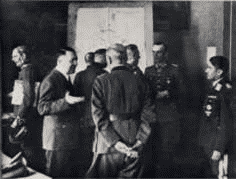 Adolf Hitler with Generals |
Turkey has begun to mass troops and
construct defensive lines along its borders with Free-French-Syria and
Iraq as the possibility of the Alliance opening a new front into Turkey is
now very real. Germany begins sending shipments of advanced weaponry and
teams of military advisors and special forces soldiers to bolster Turkish
defenses. In addition, several Luftwaffe squadrons will be sent to join
the existing Luftwaffe elements in Turkey. Hitler and the high command are
looking at maps and worrying about a British thrust towards the vital Baku
oil fields. |
June 25th 1948
Voronezh falls to German forces and leading elements of
the 1st SS Panzer Army have approached to within 20 kilometers of the Orel
Pocket. The Germans have become aware of a large Soviet buildup south of Tula
and are intent on blocking this force so that the larger Soviet army around Kursk
can be pocketed.
In an effort to stop the spread of the 'Ukrainian
Wheat Blight' the Ukraine, under orders from Germany, has begun the wholesale
burning and destruction of the wheat crop in the affected regions. German
scientists and intelligence officials have now traced the Blight back to an odd
series of Soviet bombing attacks on Ukrainian farmland in the opening days of
the fighting on the eastern front.
In a high level meeting of Axis Powers Hitler decides,
with the full support of the Axis member nations, to initiate a massive
retaliation against the Soviet Union. German scientists and military engineers
have been working for years on methods to arm their ballistic missiles with
chemical weapons and now they are going to get a chance to put their methods to
the test. Hitler orders that the retaliation must begin "before
August" and that it must be "massive in scale to convince the
Bolsheviks of their error in attempting genocide-by-famine against European
civilization".
June 27th 1948
30 kilometers north of Voronezh several German and Soviet
armored divisions run head long into each other on the open plains west of the
river Don. The battle rages all day and by nightfall no clear victor has
emerged. However, a stalemate north of Voronezh works to the advantage of the
Germans since they have bought more time to link up with their forces inside
the Orel pocket.
� On a broad front stretching from Vilnius to Minsk 40
battle-hardened but weary Soviet divisions lurch forward in hopes of sweeping
across Belarus before the Germans can prepare for a defensive stand east of Poland
- in this they are to be disappointed. The earlier German pullout from Minsk
saved them a lot of men and material and they still have a good sized reserve
of panzers as well to engage in fluid fighting on the open plains. In addition,
sizeable quantities of nerve gas have begun to arrive on this portion of the
front and the Germans are already beginning to use the nerve gas to disrupt
Soviet troop concentrations wherever they attempt to mass at the point of
attack. The Soviets still manage to drive forward in places but German
resistance is stiff along the entire Soviet axis of advance.
June 28th 1948
|
In a second day of massive and sharp armored engages
north of Voronezh, nightfall once again comes with relative stalemate.
Hundreds of German and Soviet tanks lie burning on the rolling plains
leaving countless fires to blaze through the dark of night as both sides
bring up more forces to continue the fight the next day. A Soviet pilot
would later recall that "the points of light from fires on the plain below
seemed more numerous and certainly more fierce than the lights of the
stars above". |
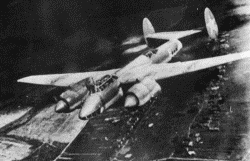 Soviet Reconnaissance Plane
|
The provisional government of Iraq, established by the
British, joins the Alliance for Democracy and declares war on the Axis powers.
The Kurdish northern region of Iraq is granted almost total autonomy but
formally remains a part of Iraq.
June 29th 1948
Elements of the German 1st SS Panzer Army link up with
German units inside of the Orel pocket. Over one million Soviet troops are now
surrounded in a pocket around Kursk. The news is met with jubilation by the
High Command and the party leadership in Berlin - but springing the trap and
keep the bear trapped are two different things. The Soviet force in the Kursk
pocket remains large and well equipped and is certainly not ready to call it
quits. To underscore this, the Soviets launch two separate attacks from out the
Kursk pocket in the late-afternoon. One strikes directly east towards
Voronezh while the other cuts northeast in a bid to break out of the Kursk
pocket and link up with the Soviet force fighting south of Tula; which would in
turn pocket German troops in and around Orel once again.�
The massive German bombing campaign around Kursk has
now shifted to pummel Tula and a nerve gas attack once again kills tens of
thousands of civilians. A mixture of nerve and mustard gas proves particularly
damaging to infrastructure since nerve gas kills any un-sheltered people in the
vicinity of the target while the mustard gas leaves targets contaminated requiring
costly and time-consuming decontamination efforts.
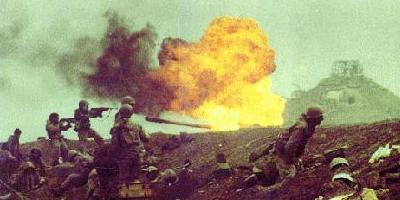
Rare color photo of Soviet infantry in action near Orel
July 1st 1948
The Soviet attack from out of the Kursk pocket and
towards Voronezh stalls under the combined pressure of massive nerve gas
attacks, German air support, and several fierce thrusts by German armor and
panzergrenadiers into the flanks of the Soviet thrust. The other attack towards
the northwest is turned aside after German panzergrenadiers make spectacular
use of the latest guided anti-tank rockets to destroy large numbers of Soviet
tanks. However, this Soviet attack draws away enough German strength to allow
the Soviet thrust down from Tula to finally break past German armor putting
German forces around Orel in danger of being pocketed again.
|
USAAF B-31 and medium bombers strike
targets all around the Gilbert Islands in the opening strike of a major
new campaign in the central Pacific. The U.S. navy has been probing the
island chain's defenses and has discovered that the Japanese navy has
largely abandoned the islands leaving the garrisons to fend for
themselves. |
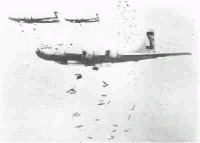 USAAF B-31 "Memphis Belle" |
Persia begins mobilizing for an offensive as the Shah
prepares to re-unite his splintered kingdom. The British have been arming and
training the Persians since the Persian Civil War of 1943 and have finally
convinced the Shah to use his new army to crush fascist Iran.
July 3rd 1948
The 8th panzer army attacks east into northern Tunisia.
Now faced with a second front the Free French in northern Tunisia are on the
brink of collapse.
July 5th 1948
After a week of confused fighting on the plains between Orel
and Voronezh the Red Army has managed to turn the tables on the Germans. Soviet
forces advancing south from Tula have established a strong corridor into Kursk
linking the reserve force from Moscow with the million man Soviet Army which
had been temporarily trapped around Kursk - and in establishing this link up
the Soviets have managed to once again pocket German forces around Orel and
this time 200,000 German troops, including an entire SS panzer division and its
supporting panzergrenadiers, have been trapped there where only 95,000 had been
trapped previously. The German high command immediately orders the forces
trapped around Orel to make a break out attempt before Hitler can order them to
fight in place. German forces attack west from Voronezh and east from Orel in
an attempt to link up and once again trap Soviet forces around Kursk.
July 6th 1948
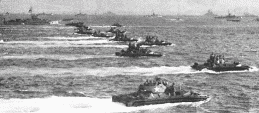 5th Marines on their way to Tarawa |
After several hours of massive off-shore and air
bombardment U.S. marines land on Tarawa and Nauru in the Gilbert Islands
and secure beach heads in the face of fierce Japanese resistance. The
Japanese attempt to use mustard and phosgene gas to disrupt the
establishment of beach heads but winds rapidly dissipate the chemicals and
in some cases blow the gasses back over Japanese positions. The U.S. for
its part makes massive use of napalm and mustard gas mixes to reduce
Japanese fortifications and trench lines. |
Riga falls to Soviet forces as the last German forces
in the city are evacuated by the Kreigsmarine under the cover of massive
off-shore bombardment. To the south the Soviet push towards the East Prussian
and Polish border has bogged down in the face of German counter-attacks and the
first massive use of nerve gas on this portion of the front.
July 7th 1948
Free French forces have been squeezed into a small pocket
consisting of Tunis and the immediate surrounding area. Italian and German
bombers and artillery hammer the pocket continuously.
July 8th 1948
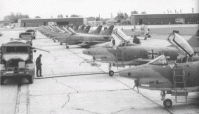 Luftwaffe air base in eastern Turkey |
With Iraq now firmly in British hands the RAF has
begun to establish large airbases in both northern Iraq and Free
French-Syria in preparation for offensive bombing operations in Turkey,
fascist Iran, and the Caucasus. The Germans, well aware of these British
preparations, have begun establishing a network of powerful air defenses
stretching from southeast Turkey all the way to the Baku oil fields.
|
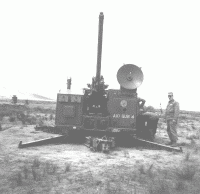 Radar guided 88mm AA |
This air defense network will include large numbers
of Turkish and German interceptors along with the latest radar guided AAA
and anti-aircraft missiles around likely targets. Baku, critically
important to the German war effort, will be defended by the largest and
most advanced integrated air defense system the world has yet seen. The
scene is being set for a great air war over Turkey and the southern
Caucasus. |
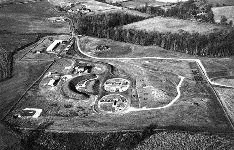 German SAM site near Baku |
July 9th 1948
The German attempt to relive the Orel pocket for a second
time fails after a strong Soviet push north from Kursk forces German forces
around Orel to shift south. Stavka has been flooding all available reserves
into the corridor from Tula to Kursk. With German forces in this area now
clearly over-extended the Soviets are massing to re-capture Voronezh and pocket
another 300,000 German soldiers.
A German submarine converted for use as an underwater
freighter delivers samples and instructions for producing nerve gases to a
Japanese warship off the East Indies. The Japanese will need at least six
months to produce any significant quantities of nerve gas even with German
samples and instructions to work with.
July 10th 1948
|
The Gilbert islands are securely in U.S. hands as
both Tarawa and Nauru have been taken by the marines. In the battle for
the two islands some 5000 Japanese are killed and only several dozen
remain alive to surrender. U.S. casualties are also extremely heavy with
roughly 3500 marines killed or wounded. U.S. engineers are already working
on repairing and upgrading the naval and air facilities of the islands for
use as a staging area to move against the Marshall Islands. |
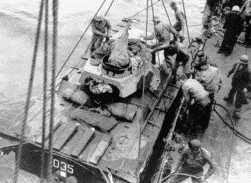 LVT(A) 1st Marines
|
Chiang Kai-shek, fearful that the Soviets will grab
much of northern China once they have finished swallowing Manchuria, decides to
launch a general offensive to coincide with the expected American push into
southern China.
July 11th 1948
With a Soviet buildup now clearly occurring west of Voronezh,
German forces begin evacuating southwest back towards Kharkov as their position
has clearly become untenable. Goering has promised Hitler that the Orel pocket
can be supplied from the air until it can be relieved.
After two weeks of trying and failing to draw the
Japanese navy into battle away from their land-based air cover the U.S. 5th
fleet turns north and steams directly towards Formosa. The Japanese South China
Sea naval task force and its four heavy carriers and several escort carriers
are due east of Formosa and their reconnaissance aircraft quickly spot the U.S.
fleet headed towards the island. The moment has arrived and the scene is set
for a huge clash of naval arms in the South China Sea.
In Naval harbors all around the Philippines tens of
thousands of U.S. marines and army soldiers wait in the cramped confines of
troop transports for final orders to hit the beaches on Formosa.
Judging that further resistance would result in
needless death and suffering the commander of Free French forces in Tunis
surrenders after his engineers destroy the harbor facilities there. After years
of bloody stalemate Italy finally holds all of Tunisia.
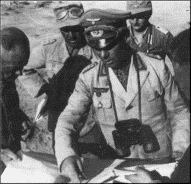 Next Stop: Algiers? |
The British have begun preparations for
a large new offensive in Libya now that Iraq has been taken. Rommel, who
is becoming known as the 'Desert Viper', has been lobbying to be allowed
to drive west towards Algiers. Guderian is against this due to the large
British threat to the east in Libya but Hitler sees an opportunity to
knock out the Free French once and for all and he doesn't want to give
Charles de Gaulle a chance to regain his
breath. The 'Desert Viper' gets his permission to strike
west. |
To Be Continued...
Back to Main
















